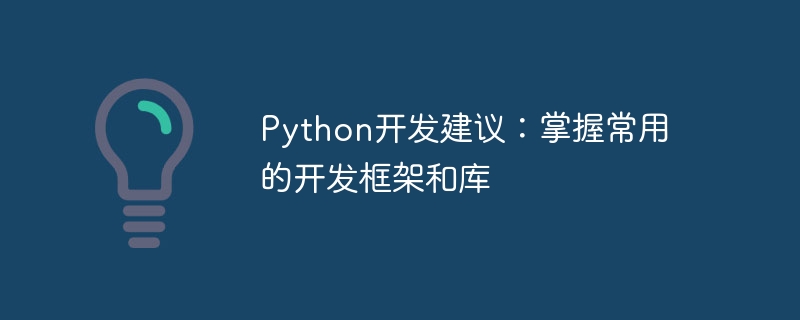
As a high-level programming language, Python is concise, easy to read and has high development efficiency, so it is becoming more and more popular in the field of software development. For developers who want to engage in Python development, in addition to being familiar with the Python language itself, they also need to master commonly used development frameworks and libraries, so that they can complete tasks more efficiently and improve the quality of the project. This article will introduce some commonly used Python development frameworks and libraries, and give corresponding learning suggestions.
- Django: Django is one of the most popular web development frameworks. It provides rich features and efficient tools, allowing developers to quickly build scalable web applications. The suggestion for learning Django is to first understand its basic MVC (Model-View-Controller) pattern and ORM (Object-Relational Mapping) mechanism, and then become familiar with its usage and scalability through exercises on actual projects.
- Flask: Flask is another popular web development framework. Its design concept is simple and flexible, suitable for small web applications. The suggestion for learning Flask is to first understand its basic routing, templates and extension mechanisms, and then become familiar with its usage and design concepts through the practice of actual projects.
- Scrapy: Scrapy is a powerful web crawler framework that can be used to extract structured data from websites. The suggestion for learning Scrapy is to first understand its basic crawling process and selector mechanism, and then familiarize yourself with its usage and debugging skills through actual crawling tasks.
- NumPy: NumPy is a Python library for scientific computing, which provides rich mathematical functions and efficient array operations. The recommendation for learning NumPy is to first understand its basic array operations and matrix calculations, and then become familiar with its usage and performance optimization techniques through actual scientific computing tasks.
- Pandas: Pandas is a Python library for data analysis and processing, which provides efficient data structures and data manipulation tools. The suggestion for learning Pandas is to first understand its basic data structure and data processing skills, and then become familiar with its usage and data visualization skills through actual data analysis tasks.
- Matplotlib: Matplotlib is a Python library for plotting charts and visualizing data. It provides a variety of plotting functions and customization options. The recommendation for learning Matplotlib is to first understand its basic plotting functions and customization options, and then become familiar with its usage and chart design techniques through actual data visualization tasks.
- TensorFlow: TensorFlow is a Python library for machine learning and deep learning that provides powerful neural network and model building tools. The recommendation for learning TensorFlow is to first understand its basic neural network and model building principles, and then become familiar with its usage and tuning techniques through actual machine learning and deep learning tasks.
In short, in the process of learning Python development, it is very important to master common development frameworks and libraries. Through targeted learning and practice, we can complete tasks more efficiently and improve development quality. Of course, in addition to the frameworks and libraries introduced above, there are many other excellent development tools and resources that we can choose to learn and apply according to our own interests and needs. I hope that all developers can continue to explore and learn and become excellent Python developers!
The above is the detailed content of Python development advice: Master common development frameworks and libraries. For more information, please follow other related articles on the PHP Chinese website!






